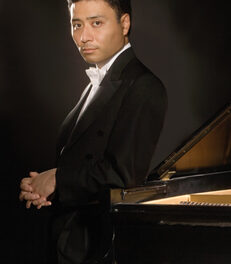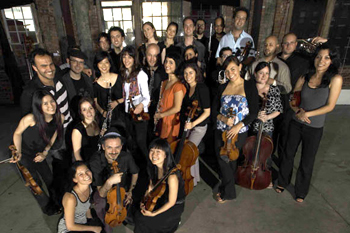Some choral music purists might look down on The King’s Singers these days and place them well behind Chanticleer or the Tallis Scholars. The ensemble’s “cred” has diminished, they say, because performances and recordings are either too low brow or too showy, sort of like the Canadian Brass vs. the Edward Tarr Brass Ensemble, for example.
These purists should have been in Wright Auditorium on East Carolina University campus Dec. 11 as part of the S. Rudolph Alexander Performing Arts Series. The latest configuration of the enduring a cappella sextet came to town with such an exquisite program — not to mention exquisite sound — that one must sigh and ask, “How do they do that?”
Whether it’s rollicking through a spiritual, “Rise Up, Shepherd, and Follow,” or offering the delicacy of Bach’s “O Little One Sweet,” with its stunning suspensions, these lads offer outstanding examples of the choral ensemble art, from start to finish. And the large and appreciative audience was fully satisfied with the effort.
A holiday concert by The King’s Singers mixes music with nearly a half-dozen readings from poetry, letters and essays relating to the season: Christina Rossetti’s “Christmas Eve,” the contemporary retelling of the nativity by Charles Causley called “Ballad of the Bread-Man,” and Percy MacKaye’s poignant letter from World War I recounting the Christmas Eve when British and German soldiers stopped shooting at each other and sang carols. Rudyard Kipling’s gentle “Eddi’s Service” and John Julius Norwich’s humorous take on “The Twelve Days of Christmas” also were part of the program.
But people came to hear The King’s Singers sing, and they did not disappoint. Whether with full ensemble or the occasional quartet, the singing was breathtaking, with purest tone, laser-like pitch, polished harmonies, splendid diction and phrasing, and the occasional creative arrangement. Simplicity trumped embellishment, as in “The Angel Gabriel” or John Rutter’s “There Is a Flower.” The singers comfortably offered songs in French, such as “Noel Nouvelet,” as arranged by singer Philip Lawson, and an extended song celebrating the winter season by Saint-Seans, “Serenade d’Hiver.” And Rutter’s lilting setting for the German text of “Stille Nacht” was lovely.
For most of the program, in fact, the mood was more one of contemplation than gaiety, more mezzo-piano than fortissimo. It was never somber or wistful, but it was designed to help rein in the often wretched excess that much of Christmas has become and focus more on the true meaning and spirit of the season.
With a wide range of voices among the six, the singers often sounded more like a mixed chorale than an all-male group. Credit goes especially to the presence of countertenor David Hurley, whose falsetto never faltered as it often carried the uppermost melody line. He was joined by countertenor Robin Tyson, whose voice had the same range but a slightly fuller tone. The two countertenors, tenor Paul Phoenix, baritones Philip Lawson and Christopher Gabbitas and bass Stephen Connolly sang in smaller groupings in several selections as well, most notably Lawson’s arrangement of “Noel Nouvelet.”
Lawson was represented in three pieces: his arrangements for “Noel Nouvelet” and “Joy to the World” and his version of “Lullay My Liking.” “Joy” was especially noteworthy for its simplicity, purity and elegance; it was almost like hearing another song entirely. Former King’s Singer Bob Chilcott was represented in the program with his arrangement of “What Child Is This?”
For those who might have thought the program was too serious, The King’s Singers squeezed in a little showmanship. “God Rest You, Merry Gentlemen” was an upbeat, almost jazzy reading, sung over lower voices copying the rhythmic background from Dave Brubeck’s “Take Five.” Before the song ended, a phrase of “Deck the Halls’ snuck in, too. The Singers also went back to the 16th century for a crisp version of “Gaudete!” and also moved into more contemporary music with “Little Drummer Boy” and a fast but elegantly sung “Jingle Bells.” They also added seasonal lyrics to ”Tis a Gift To Be Simple.”
The King’s Singers straddle nicely the line between serious and less-so. Some in the audience might have wanted all serious; some might have wanted all less serious. But the program brilliantly exhibited the vocal strengths of the singers, while also reminding the audience that the true spirit of the season rests more on the simple than the complex, more on the beauty than the bombast.












